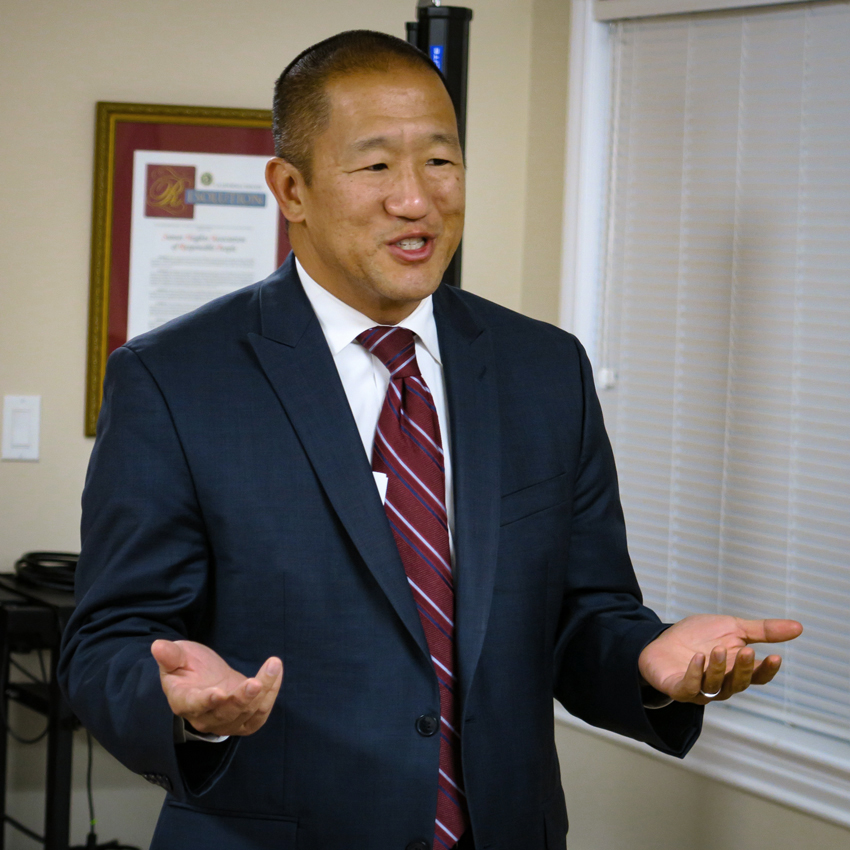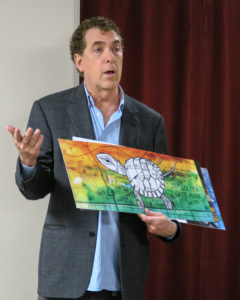Monday, August 28, 2017

Neighborhood resident Victor Hwang came to SHARP eight months after being sworn in as the newest judge on the San Francisco County Superior Court. He was elected in November 2016 by a nearly 2-1 margin. He is personable, patient, and an excellent lawyer, all of which he needs to be in his new job. Among other topics, he spoke about how judges are selected and trained, the funding crisis in San Francisco courts, and how it affects their operation. He gave us the rare opportunity to see the justice system from the perspective of one of the more important people charged with the difficult task of making it work.
Judge Hwang began work as a superior court judge on January 3, 2017. The presiding judge (who is elected by the other judges) normally assigns rookie judges to traffic court, civil harassment court, or small claims court. Judge Hwang got traffic court, where he hears some 200 cases in each 5 ½-hour court day. Very few of the defendants have lawyers. Given the volume of cases, he must move them expeditiously but at the same time must listen to people, make them feel heard, never lose his temper or raise his voice, and of course show no bias—not an easy balance to strike. Asked how he guards against becoming arrogant as a judge, Judge Hwang said he relies on his experience as a lawyer who was subject to judges and on his wife, who “keeps it real at home.”
Apart from 24 years of experience as a lawyer, Judge Hwang’s training so far has consisted of two days of watching trials and three days of acting as a judge in simulated situations. In 2018, he is scheduled to go to judicial college for more training. Like all judges, he must follow a strict code of ethics. He is prohibited from fundraising, lending his name to a fundraising effort, or making endorsements, even of a restaurant on Yelp.
The state courts are experiencing a financial crisis, especially the superior courts in San Francisco. The state’s Judicial Council, which administers the courts statewide, has determined that SF superior courts have been “over-resourced.” For the fiscal year beginning in July 2017, the Judicial Council took $5.3 million from the SF Superior Court (9% of its budget) and reallocated the money to the courts in other counties. To help cover the shortfall, the SF courts exhausted reserve funds and used donations from judges. The judges voluntarily donated part of their salaries (which are fixed by state law). San Francisco’s superior courts had been closed one day a month to reduce costs. As of September 2017, the closures increased to one day a week. The number of judges may be reduced.
A complicated formula determines the allocation of funds among the courts of the state’s counties. The formula is based on the number of cases a county handles. Since San Francisco has a disproportionately large number of jury trials, which are time-consuming (as well as costly in themselves), our superior courts handle relatively few cases, disadvantaging SF in the funding formula.
Judge Hwang did not discuss why there is a financial strain statewide on courts, why the allocation formula is what it is, or what, if anything, is likely to be done to adjust it. He did say that budgets should not be drastically cut from one year to another, as the SF superior court budget has been, because such cuts make it very difficult to plan and therefore to budget. He also said that systemic changes tend to happen in cycles, driven by a public that swings between, on the one hand, “tough on crime” measures, with their relatively more generous funding, and, on the other hand, cost-cutting “efficiency.”
There is no indication that the funding crisis will improve. Further financial stresses include the costs of staff. At the time of our meeting, court interpreters were on strike, demanding pay increases. The Hall of Justice, at 850 Bryant Street, where most criminal trials are held, is notoriously unsanitary and is not earthquake safe, yet there are no plans for a new courthouse.
SF superior courts produce more revenue than courts in other counties. Judge Hwang estimated that SF traffic court brings in $15,000 a day, most of which goes to the state. He expects revenue from traffic court to decrease because the system is changing so that the driver’s license of a guilty defendant will no longer be suspended if she fails to pay a fine. With that incentive to pay removed, guilty defendants are likely to pay fewer fines. The thinking behind the change is that suspension of a driver’s license can be too harsh a penalty for non-payment of a fine, particularly when the defendant is indigent. Judge Hwang said most defendants are less concerned with fines than with the increased insurance rates they incur after a guilty verdict.
Especially because the funding formula rewards the number of resolved cases, there is great pressure on judges and litigants to settle cases rather go to trial, with the extra time and expense a trial entails. Likewise, there is great pressure in criminal cases to resolve cases by plea bargain. Though trial judges must approve every plea bargain, it is very rare for a judge not to do so. For similar reasons, judges tend to accept the recommendations of the probation department in choosing a sentence. If a judge does not accept the recommendation, she must explain why not, which can be time-consuming. The system is driven by the need to resolve cases expeditiously.
Like several other jurisdictions in the country, San Francisco uses the so-called “Arnold tool,” an algorithm that creates a “public safety assessment” (PSA) to determine whether a person charged with a crime should be released before trial. Some consider the algorithm more fair than the traditional system—bail, which favors defendants who have access to large sums of money. Under the bail system, about 90 percent of defendants charged with felonies were held before trial, whereas now, under the Arnold tool most felony defendants are released before trial.
The Arnold tool is controversial, particularly in light of the 2017 robbery-murder of a photographer on Twin Peaks. One of the defendants charged with that crime had been arrested on charges of carrying a gun while on probation but was released. Reportedly, the data about him that determined his PSA score had been incorrectly entered.
Although all superior court judges are supposed to be elected, few actually are. Typically, a person becomes a judge when the Governor appoints her to fill the vacancy created by the retirement of a judge. The replacement judge serves the remainder of the six-year term, then stands for election. However, she is unlikely to be challenged, and the names of judges who stand for election but are unopposed do not appear on the ballot. Sitting judges are likely to be unopposed for election in part because practicing lawyers in the superior court are the most likely candidates, and they are reluctant to challenge sitting judges for fear that all superior court judges will hold a grudge against a challenger. Judge Hwang won his seat in a contested election because there was no incumbent, a rarity. He did not have the “political juice” to become a judge via appointment by the Governor.
Judge Hwang stressed the value of jury trials. He noted a particular case in which he was inclined to credit the defense and acquit the defendant, but the jury assessed the evidence differently and convicted. Because the right to a jury trial is fundamental and a jury should be representative of the community, Judge Hwang is hard on the excuses people offer to try to be relieved of jury duty. At the same time he does what he can to accommodate jurors and to explain the often unanticipated delays that inevitably arise during a trial. He suggested that the experience of serving on a jury is rewarding, even if the delays are frustrating.
——-
Jim Billings began the evening by giving us a 10-minute introduction to San Francisco Beautiful. He is SF Beautiful’s Development Manager.
